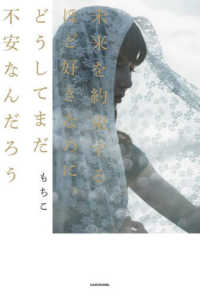- ホーム
- > 洋書
- > 英文書
- > Cinema / Film
Full Description
This book examines postcolonial filmmakers adapting Victorian literature in Hollywood to contend with both the legacy of British imperialism and the influence of globalized media entities. Since decolonization, postcolonial writers and filmmakers have re-appropriated and adapted texts of the Victorian era as a way to 'write back' to the imperial centre. At the same time, the rise of international co-productions and multinational media corporations have called into question the effectiveness of postcolonial rewritings of canonical texts as a resistance strategy. With case studies of films like Gunga Din, Dracula 2000, The Portrait of a Lady, Vanity Fair and Slumdog Millionaire, this book argues that many postcolonial filmmakers have extended resistance beyond revisionary adaptation, opting to interrogate Hollywood's genre conventions and production methods to address how globalization has affected and continues to influence their homelands.
Contents
ACKNOWLEDGMENTS
INTRODUCTION. Accented Slants, Hollywood Genres: An Interfidelity Approach to Adaptation Theory
CHAPTER 1. Colonial Discourse, George Stevens's Gunga Din, And the Hollywood Studio System
CHAPTER 2. "He Is Not Here by Accident": Transit, Sin, and the Model Settler in Patrick Lussier's Dracula 2000
CHAPTER 3. Those Other Victorians: Cosmopolitanism and Empire in Jane Campion's The Portrait of a Lady
CHAPTER 4. Imperial Vanities: Mira Nair, William Makepeace Thackeray, and Anglo-Indian Cultural Commodity in Vanity Fair
CHAPTER 5. Epic Multitudes: Postcolonial Genre Politics in Shekhar Kapur's The Four Feathers
CHAPTER 6. Gentlemanly Gazes: Charles Dickens, Alfonso Cuarón, and the Transnational Gulf in Great Expectations
CHAPTER 7. Indie Dickens: Oliver Twist as Global Orphan in Tim Greene's Boy Called Twist
CHAPTER 8. Three-Worlds Theory Chutney: Oliver Twist, Q&A, and the Curious Case of Slumdog Millionaire
CONCLUSION: Streaming Interfidelities and Post-Recession Adaptation
NOTES
BIBLIOGRAPHY







